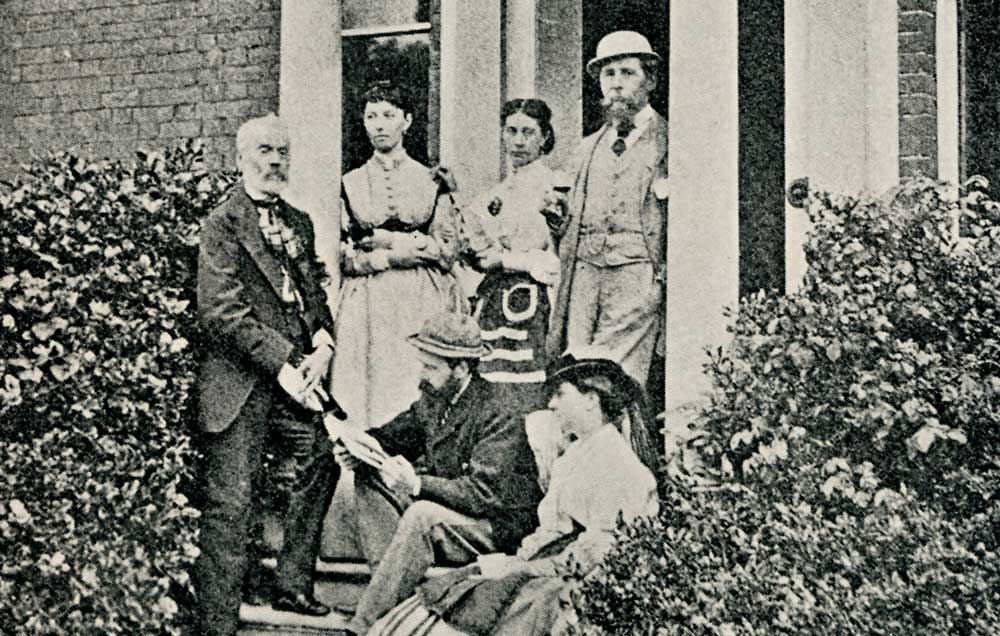The Wing of Friendship | History Today - 5 minutes read

Georgina Hogarth was one of the most important women in Charles Dickens’ life. He called her his ‘best and truest friend’ and said that she had ‘a higher claim … upon my affection, respect, and gratitude than anybody in this world’. In his last will and testament he made Georgina a guardian of his youngest son, despite his wife still being alive, and bequeathed her all his private papers and much-treasured personal objects. He also left her the huge sum of £8,000 (over a million pounds today). For her part, Georgina was devoted to the point of obsession with Dickens and, in the almost 50 years she survived him, fiercely guarded his reputation and literary legacy. Their relationship was forged over 28 years and only ended when Dickens had a fatal stroke one evening when they were dining alone at their Gad’s Hill home. Today, Georgina is described as Dickens’ housekeeper, his confidante and adviser. Yet this only gives a partial picture of what was an ever-changing relationship – changes which had a greater impact on Georgina than on Dickens. How did they become so close? What explanation is there for Georgina’s almost worshipful attitude towards Dickens, especially as she admitted after his death that ‘my life has been a curious one … and I have often felt it hard – and wondered whether it was all a mistake – and a waste!’
Georgina was a younger sister of Dickens’ wife, Catherine. Aged 15 she moved in with her sister and famous brother-in-law. Dickens was talented, charismatic, handsome and kind, and treated her as a favourite, indulged young daughter. Georgina was generally a sensible teenager but this did not prevent her from displaying a touch of teenage arrogance. For instance, on the basis of attending a few parties at Harrison Ainsworth’s home, she made the bold claim that the celebrated (and 38-year-old) author was a ‘friend of mine’. Dickens was partly to blame for encouraging her as he sometimes appeared to forget she was still young and socially inexperienced. This was certainly the case when he allowed his enthusiasm for matchmaking to override his duty to protect Georgina’s reputation. Keen to encourage a romance with his best friend, the artist Daniel Maclise, he persuaded Georgina to pose for a painting in which she appeared semi clad. However, the father-daughter phase of their relationship was a happy one and the stage of her life Georgina regarded as the most joyful.
In her early twenties, Georgina had a strong bond with Catherine and a genuine friendship with Dickens. They shared a sense of humour and Georgina often played pranks or mimicked friends to entertain him. She joined his amateur theatrical group, debated political matters and accompanied him on his daily walks. Georgina was one of the few people with the stamina to hike for 12 miles at Dickens’ fast pace. Their relationship was at its most even at this point, but when Dickens ended his marriage by banishing Catherine from the family home, everything changed.
Flying in the face of Victorian expectations, Georgina did not leave with her sister but remained with Dickens. There were rumours that Georgina was the cause of the Dickens’ separation, with whispers of an affair and gossip that she had borne him illegitimate children. Dickens, worried about losing his readers and his popularity, dealt with the scandal by defending himself and Georgina but also by distancing himself from her. In the census he entered her as ‘servant-housekeeper’ thereby demoting her presence in his household to below stairs. Georgina was eager to help Dickens maintain his reputation, regardless of the cost to her status; she wholeheartedly supported his argument that Catherine was an unfit mother and refuted reports that he was in love with the young actress Ellen Ternan. In the immediate years following the separation, Dickens was unsettled, unhappy and increasingly self-absorbed. One afternoon in June 1862 when they were at Gad’s Hill, Georgina had what appeared from Dickens’ reports to be a mental and physical breakdown. Whatever caused it – from circumstantial evidence it seems to have been connected to Ellen Ternan – it altered their relationship once more. He had taken her for granted, issuing instructions on everything from how to launder his clothes to dealing with servants and handing over responsibility for difficult relatives to her.
Following her illness, however, Dickens became more solicitous and there was a shift back to a warmer, more equal relationship. He urged her to see a doctor over the slightest illness, arranged treats and reminded her of how important she was to him by signing his letters ‘sending you my deepest love and attachment’. Despite this, Georgina took years to recover physically and did not regain her emotional equilibrium until long after Dickens’ death. She appeared to have completely lost any self-confidence, becoming wholly obsessed by and dependent on Dickens: anxious at the thought of him being away from home for any length of time, repeating his opinions as if they were her own, wary of upsetting him and fretting constantly over his wellbeing.
Dickens and Georgina’s relationship was remarkable in a number of ways. Most significant are the range of roles they played at different times in each other’s lives. Then there is the fact that the older, successful Dickens and the younger, dependent Georgina forged a deep, reciprocal bond at a time when power and prestige lay in the hands of men. In spite of all the changes, the notoriously mercurial Dickens never fell out with Georgina and she never complained about the damage done to her status and reputation by remaining in his household. Their harmony is not in doubt but whether theirs was a truly reciprocal friendship is open to debate.
Christine Skelton is Emeritus Professor at the University of Birmingham and the author of Charles Dickens and Georgina Hogarth (Manchester University Press, 2023).
Source: History Today Feed